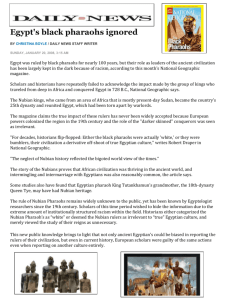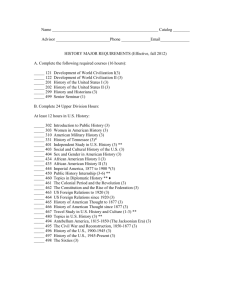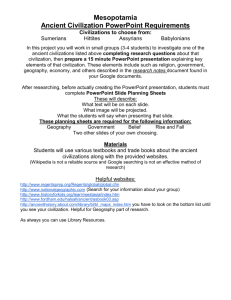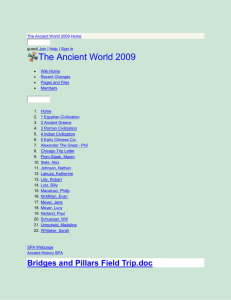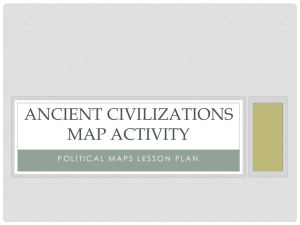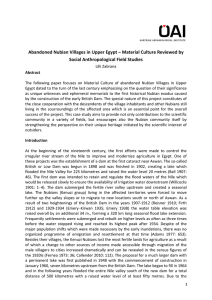Standing on the Shoulders of Giants
advertisement
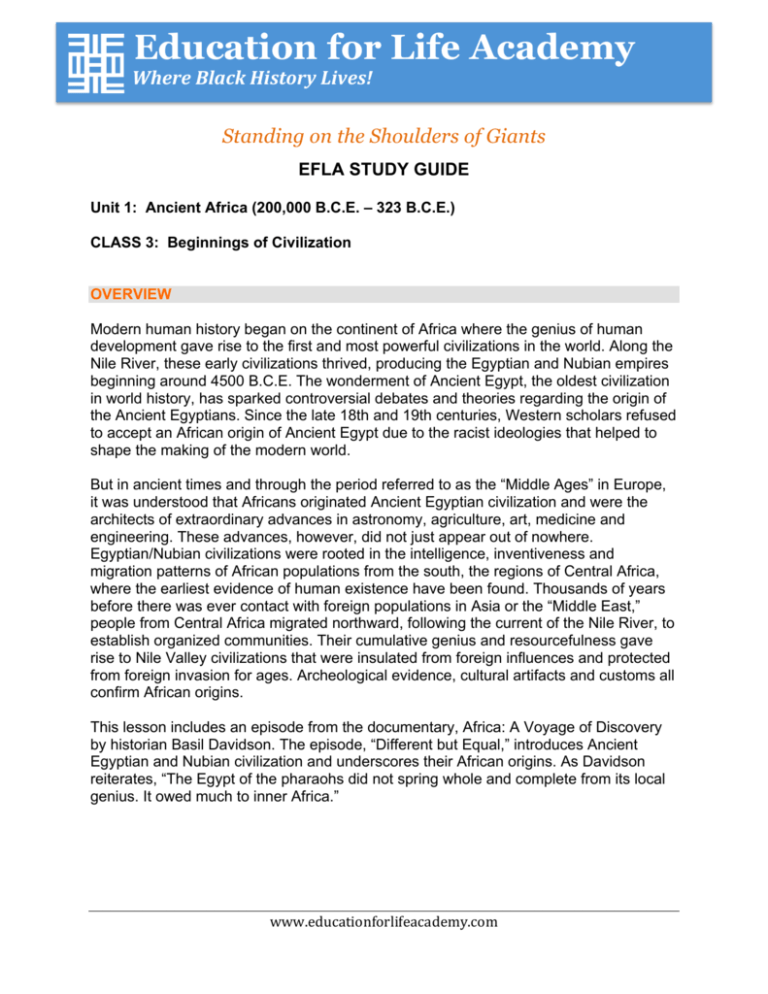
Education for Life Academy Where Black History Lives! Standing on the Shoulders of Giants EFLA STUDY GUIDE Unit 1: Ancient Africa (200,000 B.C.E. – 323 B.C.E.) CLASS 3: Beginnings of Civilization OVERVIEW Modern human history began on the continent of Africa where the genius of human development gave rise to the first and most powerful civilizations in the world. Along the Nile River, these early civilizations thrived, producing the Egyptian and Nubian empires beginning around 4500 B.C.E. The wonderment of Ancient Egypt, the oldest civilization in world history, has sparked controversial debates and theories regarding the origin of the Ancient Egyptians. Since the late 18th and 19th centuries, Western scholars refused to accept an African origin of Ancient Egypt due to the racist ideologies that helped to shape the making of the modern world. But in ancient times and through the period referred to as the “Middle Ages” in Europe, it was understood that Africans originated Ancient Egyptian civilization and were the architects of extraordinary advances in astronomy, agriculture, art, medicine and engineering. These advances, however, did not just appear out of nowhere. Egyptian/Nubian civilizations were rooted in the intelligence, inventiveness and migration patterns of African populations from the south, the regions of Central Africa, where the earliest evidence of human existence have been found. Thousands of years before there was ever contact with foreign populations in Asia or the “Middle East,” people from Central Africa migrated northward, following the current of the Nile River, to establish organized communities. Their cumulative genius and resourcefulness gave rise to Nile Valley civilizations that were insulated from foreign influences and protected from foreign invasion for ages. Archeological evidence, cultural artifacts and customs all confirm African origins. This lesson includes an episode from the documentary, Africa: A Voyage of Discovery by historian Basil Davidson. The episode, “Different but Equal,” introduces Ancient Egyptian and Nubian civilization and underscores their African origins. As Davidson reiterates, “The Egypt of the pharaohs did not spring whole and complete from its local genius. It owed much to inner Africa.” www.educationforlifeacademy.com LEARNING OBJECTIVES After completing this lesson, students will be able to: ü Identify evidence of “inner African originality” from Nubian culture ü Identify ancient customs that continue to define Nubian culture today ü Compare the depictions of Africans in European art in relation to racial attitudes ü Discuss how European racial attitudes towards Africans changed over time ASSIGNMENT View the following documentary and answer the study questions. Documentary: Africa: A Voyage of Discovery, Episode 1/8 - Different but Equal (55 min) Link: https://www.youtube.com/watch?v=ZaQiGDZVDz4 Study Questions 1. How were people of African descent depicted in the artwork from the era of the European Renaissance? 2. What caused the enormous change in the racial attitudes among whites? 3. What do the rock paintings discovered in the Matopo Hills of modern Zimbabwe reveal about the region of the Sahara? 4. List evidence of “inner African originality” found in Nubian/Kush/Meroe culture and archeological discoveries. 5. Which Nubian Pharaoh is mentioned in the Bible in the Book of Kings? 6. What is the name of the capital of Kush? 7. Davidson believes that the principle function of the structures at Musawwarat were used for what purpose? 8. Which military leader may have benefitted from the training of elephants in Kush? 9. When did the kingdom of Kush collapse? www.educationforlifeacademy.com 10. Which of the oldest sporting events links the Nuba people to those of Ancient Kush? 11. How do the customs of Muslim Nubian women differ from Muslim women in other regions? 12. What caused the Muslim invasion led by Saladin of Christian Nubia despite centuries of peaceful coexistence between the two religions? 13. In which European country is St. Maurice portrayed as a Black Nubian instead of white? SUPPLEMENTAL MATERIAL Books Anthony Browder, Nile Valley Contributions. Institute for Karmic Guidance, 1992. John Henrik Clarke, African People in World History. Black Classic Press, 1993. Basil Davidson, African Civilization Revisited: From Antiquity to Modern Times. Africa World, 1990. Cheik Anta Diop, The African Origins of Civilization: Myth or Reality? Chicago Review Press, 1989. John G. Jackson, Introduction to African Civilization. Citadel, 2001. George G. M. James, Stolen Legacy: The Egyptian Origins of Western Philosophy. The Journal of Pan-African Studies ebook, 2009. Link: http://www.jpanafrican.com/ebooks/eBook%20Stolen%20Legacy.pdf www.educationforlifeacademy.com

